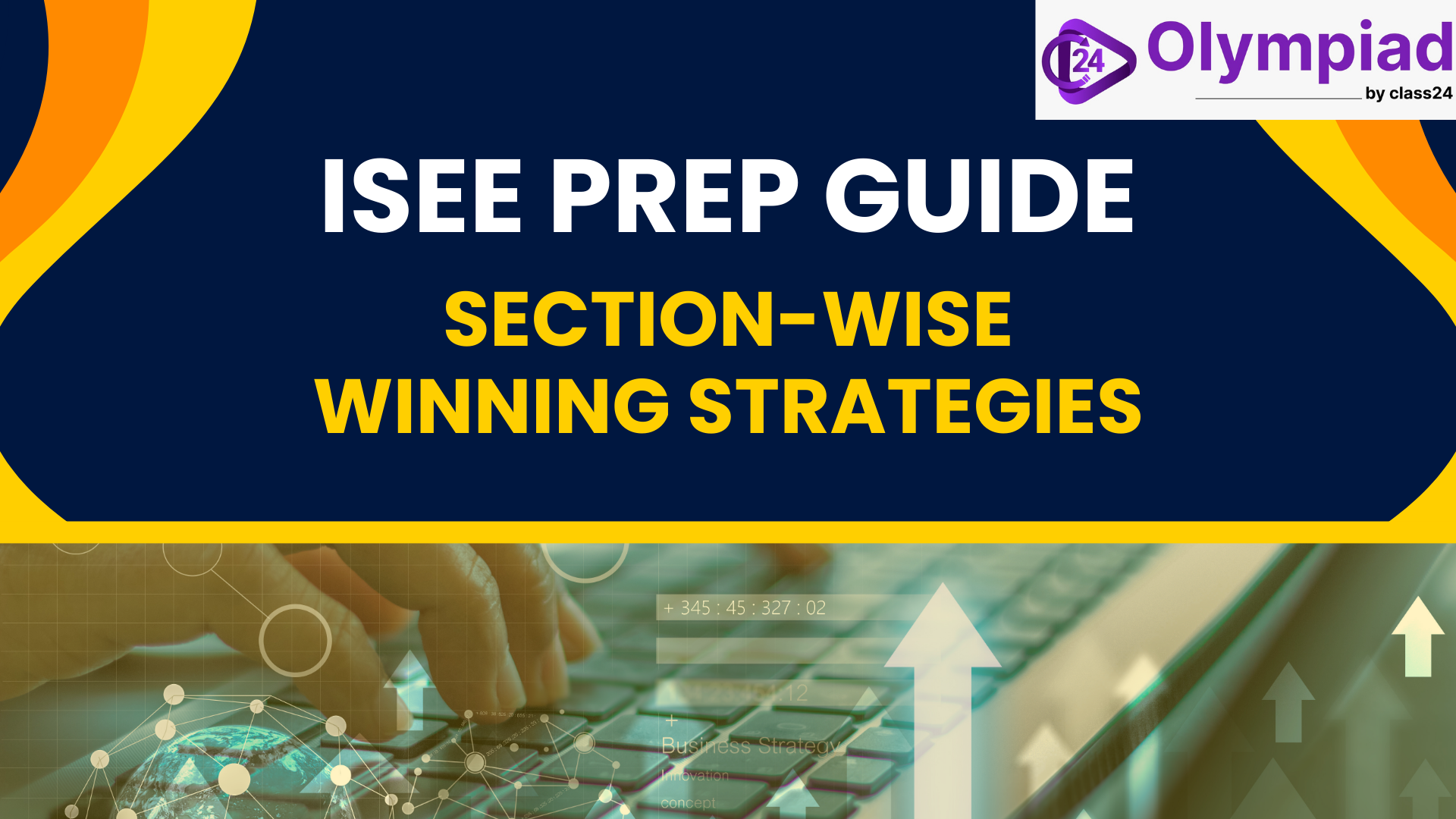
The Independent School Entrance Exam (ISEE) is not just a test; but, a window to the best international schools that require a balanced student with an analytical mind and a good verbal and reasoning ability. The ISEE Preparation accurately represents the thoughts on the minds of students unlike most school exams that simply check what students have memorized.
Here is the trick: not every part is equal. Solid vocabulary is required in Verbal Reasoning. Critical analysis is pushed by the Reading Comprehension. Quantitative Reasoning is rewarding logical problem-solving. Mathematics Achievement tests organized knowledge. And creativity and systematic thinking is evident in the Essay.
Introduction – Why Section-Wise Mastery Matters
Students who make the ISEE Prep Guide more successful sometimes spend time in vain because they do not focus only on one section during ISEE preparation. The true winners are the ones who understand how to attack key profit generating territories, improve on weak areas and utilize tested approaches to get the most out of their time.
That is where Class24 differs, with the structured course blending the best traditions of world renowned ISEE Prep Guide leaders with the latest techniques of online learning to help the students really crack the code.
A. Verbal Reasoning – The Power of Words
What makes it important: Good vocabulary means better performance not only when completing sentences, but also reading comprehension. This part will challenge your knowledge about word nuances, relationships and logic.
Winning Tactics by Level
Lower Level (5th -6th grade):
- During this process vocabulary is approaching maturity, and therefore it is suggested to maintain the learning as interactive.Use word-based games (Scrabble, Hangman, Boggle), to increase vocabulary naturally.
- Study the synonyms and antonyms with coloured flashcards.
- Use short stories or comics and write the new words and learn the meaning replacing them with simpler words.
Middle Level (7th -8th grade):
- In this school, students are ISEE Prep Guide to use more systematic vocabulary learning.
- Emphasis on roots and prefixes (e.g. bio = life, geo = earth). They work as the so-called word puzzles that simply enable one to guess the unfamiliar words.
- Keep a word journal- Restricted to 10-15 new words every week; you should write your personal sentences using the same words.
- Practice figurative expressions (e.g. when you see the word combination hand : glove :: foot : sock, if you know analogies, then you can see the relations between the words.
Upper Level (9th grade and above):
- The more academic words and context comes in.
- Find ample reading materials in the newspapers, science blogs and history magazines to come across complex words when used.
- Try Quizlet or Anki: flashcards that use spaced repetition.
- Learn tone words (sarcastic, optimistic, skeptical), because they are frequently used in the comprehension questions.
Pro Tip: Doing it though memorization is not sufficient, use new words in day to day talk or mini essays to make the use of them stick.
B. Quantitative Reasoning – Think Smart, Not Hard
Why it is important: This part does not only challenge formulas, but also logical thinking and problem solving. Students tend to fail as they tend to jump into calculating and fail to pick up the patterns.
Winning Tactics by Level
Lower Level:
- Do basic pattern number work (2, 4, 8, 16, …) and focus on logic sequence.
- To enhance reasoning, play logic puzzles or Sudoku.
- Beef up on mental additions and subtractions by not depending on calculators.
Middle Level:
- Become familiar with fractions, decimals and percentages, as they are common approaches in a word problem.
- Develop top speeds to arrive at answers (approximating fractions, rounding numbers) to save on time.
- Find answers to logic problems involving a mixture of logic and arithmetic steps.
Upper Level:
- Plunge into the bottom of algebra (expressions, equations, simple inequalities).
- Major in exegesis or reading graphs, charts and tables.
- Train yourself in mental math short cuts of squares, percentages and ratios.
Pro Tip: Spend at least 15 minutes a day solving number puzzles or logical riddles—they sharpen the same skills tested here.
C. Reading Comprehension – Reading Between the Lines
Why it matters: The main idea, tone, inference, and purpose of the writer's questions are required next to the ISEE passages as opposed to the casual reading. Students have to be trained how to read critically and not pleasurably.
Winning Tactics by Level
Lower Level:
- Take short fables or little articles of the children, and give its chief lesson in a jotting down.
- When reading, emphasize who, what, where and when.
- Ask the basic questions such as: What is the story all about?”
Middle Level:
- Few words camber and encapsulation displayed in 2-3 paragraphs in your own words and
- Separate the main ideas and supporting details.
- Train yourself to detect the purpose of the author, as well as whether he is explaining, convincing or entertaining.
Upper Level:
- Train on articles which are longer nonfiction (editorial, science reports, biographies).
- Emphasis on the study of questions of inference, which check unspoken meaning.
- Learn how to pick tone words (e.g. critical, humorous, cautious) to display the attitude of the author.
Pro Tip: After reading anything—a news article, a short story—practice explaining it in one clear sentence.
D. Mathematics Achievement – Knowledge in Action.
Why it matters: In contrast to Quantitative Reasoning, this week is really about actual mathematics knowledge- algebra, geometry, arithmetic, and word problems.
Winning Tactics by Level
Lower Level:
- Consolidate multiplication / division tables and basic geometry (shapes, area, perimeter).
- Train on solving academic level word problems in steps.
- Apply visual aids, such as drawings, or math blocks when learning geometry.
Middle Level:
- Work on fractions, decimals and percent conversions.
- Start with simple algebra (solving of elementary algebraic equations).
- Study mathematics rules (angles and triangles, the area of rectangles).
Upper Level:
- Be familiar with algebra equations, inequalities and word problems.
- Revise the basics of geometry (polygons, circles, angles, perimeters).
- Time-limited practice sets should be solved to develop the speed and accuracy.
Pro Tip: Create a personal formula sheet (areas, volumes, algebra shortcuts) and revise it daily.
E. Essay Writing – Your Voice, Your Story
The significance of it: Although the essay itself is not assessed, admissions officers read it. It reveals your clarity of mind, writing and authenticity.
Winning Tactics by Level
Lower Level:
- Write family anecdotes (Introduction, middle, conclusion).
- Lay stress on simple sentences rather than on bombastic words.
- Practice Real Experience like ‘My favourite school project’.
Middle Level:
- Study paragraph structure (first sentence/topic followed by supporting ideas and a conclusion).
- Use everyday life, books or shows to support the arguments.
- Shorter sentences should be used and writing that is too complex must be avoided.
Upper Level:
- Apply the five paragraph blueprint (intro and 3 body paragraphs and conclusion).
- Illustrate with illustrations of reality, history or literature.
- Leave an impression with a take away message.
Pro Tip: Stay real and stay authentic and do not overestimate individuality. Essays are appreciated at schools that demonstrate your real character.
ISEE Prep Guide: Section-Wise Preparation
| Section |
Lower Level (4th–5th) |
Middle Level (6th–7th) |
Upper Level (8th & above) |
| Verbal Reasoning |
Word games, synonyms, short stories |
Roots/prefixes, word journals, analogies |
Academic reading, flashcards, tone words |
| Quantitative Reasoning |
Number patterns, Sudoku, mental addition |
Fractions/decimals, estimation, logic puzzles |
Algebra basics, data interpretation, mental math |
| Reading Comprehension |
Summarize fables, highlight key info |
Distinguish main vs details, author’s purpose |
Editorials, inference questions, tone analysis |
| Math Achievement |
Tables, shapes, simple word problems |
Fractions, algebra basics, geometry rules |
Algebra, advanced geometry, timed word problems |
| Essay Writing |
Personal stories, clear sentences |
Paragraph structure, examples from life |
Five-paragraph essays, real-life examples, strong conclusion |
This way, students in lower, middle, and upper grades all see exactly what matters for their level—and can ISEE Prep Guide smartly instead of feeling overwhelmed.
Conclusion
It is not enough to study all the time by cracking the ISEE- it is about working smart. Following a section-by-section plan, extensive knowledge base in key areas, an understanding of the time management, and learning under coach guidance, students can turn ISEE preparation into admission acceptance letters in leading schools. The exam can appear as a challenge, yet with the proper strategies, tools and Class24 at your disposal excellence is no longer an option, it is inevitable.
FAQs
Start at least 3–4 months before the test to cover all sections thoroughly.
Focus on vocabulary, synonyms, analogies, and practice reading comprehension daily.
Use official ISEE guides, practice workbooks, and online mock tests for all sections.
Practice timed tests, allocate time per question, and skip difficult ones to maximize scores.
Yes, they help track progress, improve speed, and familiarize you with exam format.
Maintain a study schedule, take regular breaks, practice meditation, and solve previous year papers.





Leave a Comment